Ah it’s been a difficult winter hasn’t it? Here in Kansas we had tons of snow and then rain. Nebraska is flooding. People are complaining.
When things get difficult I often reflect on how things were for our ancestors. We are so spoiled if we stop to think how things were for them. They had no air conditioning or central air to keep them comfortable, no heated cars to jump into only a horse to cuddle up to to keep warm. They struggled every day to survive. Here are some interesting facts from England in the 1500’s and how it use to be. Next time you start to feel frustrated with your situation…stop and reflex on what your ancestors coped with.
Marriage in June
 Most people got married in June because they too their yearly bath in May and still smelled pretty good by June. However, they were starting to smell, so brides carried a bouquet of flowers to hid the body odor.
Most people got married in June because they too their yearly bath in May and still smelled pretty good by June. However, they were starting to smell, so brides carried a bouquet of flowers to hid the body odor.
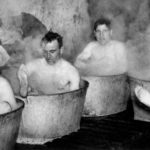 Want a bath?
Want a bath?
Baths consisted of a big tub filled with hot water. The man of the house had the privilege of the nice clean water. All of the other sons and men in the house were next. Finally the women and then the children. Last was all of the babies. By then the water was so dirty you could actually lose someone in it. Hence the saying, “Don’t throw the baby out with the bath water.”
Raining Cat’s and Dogs
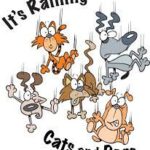 Houses had thatched roofs, thick with straw, piled high, with no wood underneath. It was the only place for animals to get warm with the weather was cold, so all the dogs, cats and other small animals such as mice, and bugs, lived in the roof. When it rained it became slippery and sometimes the animals would slip and fall off the roof. From this we get the saying “It’s raining cats and dogs!”
Houses had thatched roofs, thick with straw, piled high, with no wood underneath. It was the only place for animals to get warm with the weather was cold, so all the dogs, cats and other small animals such as mice, and bugs, lived in the roof. When it rained it became slippery and sometimes the animals would slip and fall off the roof. From this we get the saying “It’s raining cats and dogs!”
A Canopy Bed
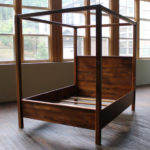 There was nothing to stop things from falling into the house. The was a real problem in the bedroom where bugs and other droppings could make a mess on your nice clean bed. People would make beds with big posts and hang a sheet over the top to give a bit of protection from the falling debris. That’s how canopy beds came into existence.
There was nothing to stop things from falling into the house. The was a real problem in the bedroom where bugs and other droppings could make a mess on your nice clean bed. People would make beds with big posts and hang a sheet over the top to give a bit of protection from the falling debris. That’s how canopy beds came into existence.
Dirt Poor
The floor was made of dirt. Only the very wealthy had something other than a dirt floor and therefore those with dirt floors were “dirt poor” . The wealthy had slate floors that would get slippery in the winter when wet, so they would spread thresh (straw) on the floor to help keep their footing. As the winter wore on they could continue to add more straw or thresh as it was called, until it would start slipping outside when the door was pushed open. A piece of wood was placed in the entrance and so the term “threshold” was born.
Peas Porridge
 How many of you remember the rhyme “Peas porridge hot, peas porridge cold, peas porridge in the pot, nine days old”?
How many of you remember the rhyme “Peas porridge hot, peas porridge cold, peas porridge in the pot, nine days old”?
In the old days, they cooked in the kitchen with a big kettle that would hang over the fire. Every day they would light the fire and add things to the pot. They mostly ate vegetables and did not get much meat. They would eat the stew for dinner, leaving leftovers in the pot to get cold overnight and then start over the next day. Sometimes the stew had food in it and it had been there for quite awhile, hence the rhyme.
Chewing the Fat
Occasionally they were able to obtain pork, which made them feel quite special. When visitors would come, they would hang up their bacon to show off. It was a sign of wealth that a man “could bring home the bacon” They would cut off a little to share with guest and would all sit around and “chew the fat”.
Tomatoes were Poisonous
 People with money had plates made of pewter. Food with a high acid content would cause some of the lead to leach onto the food and cause lead poisoning and death. This happened most often with tomatoes, so for the next 400 years or so, tomatoes were consider poisonous.
People with money had plates made of pewter. Food with a high acid content would cause some of the lead to leach onto the food and cause lead poisoning and death. This happened most often with tomatoes, so for the next 400 years or so, tomatoes were consider poisonous.
Trench Mouth
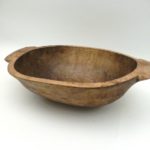 Most people did not have pewter plates but rather trenchers, which was a piece of wood with the middle scooped out like a bowl. Often trenchers were made from stale bread that was so old and hard they could be used for quite some time. Trenchers were never washed and would and mold got into the wood and old bread. After eating of wormy, moldy trenchers one would get what they called “trench mouth”.
Most people did not have pewter plates but rather trenchers, which was a piece of wood with the middle scooped out like a bowl. Often trenchers were made from stale bread that was so old and hard they could be used for quite some time. Trenchers were never washed and would and mold got into the wood and old bread. After eating of wormy, moldy trenchers one would get what they called “trench mouth”.
Upper Crust
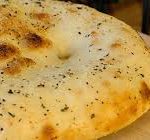 Bread was divided according to status. Workers would get the burnt bottom of the loaf, and the family got the middle. Guest would get the top or the “upper crust” .
Bread was divided according to status. Workers would get the burnt bottom of the loaf, and the family got the middle. Guest would get the top or the “upper crust” .
I hope you’ve enjoyed a little trip back in time. Next time you want to complain stop and think how it “could be” or how it “was”. It’s amazing so many survived to leave a heritage. If you’ve enjoyed this or know of where an old time saying originated…please share with us in the comments!
As Always!
Happy Hunting
The Pierce Family Historian
